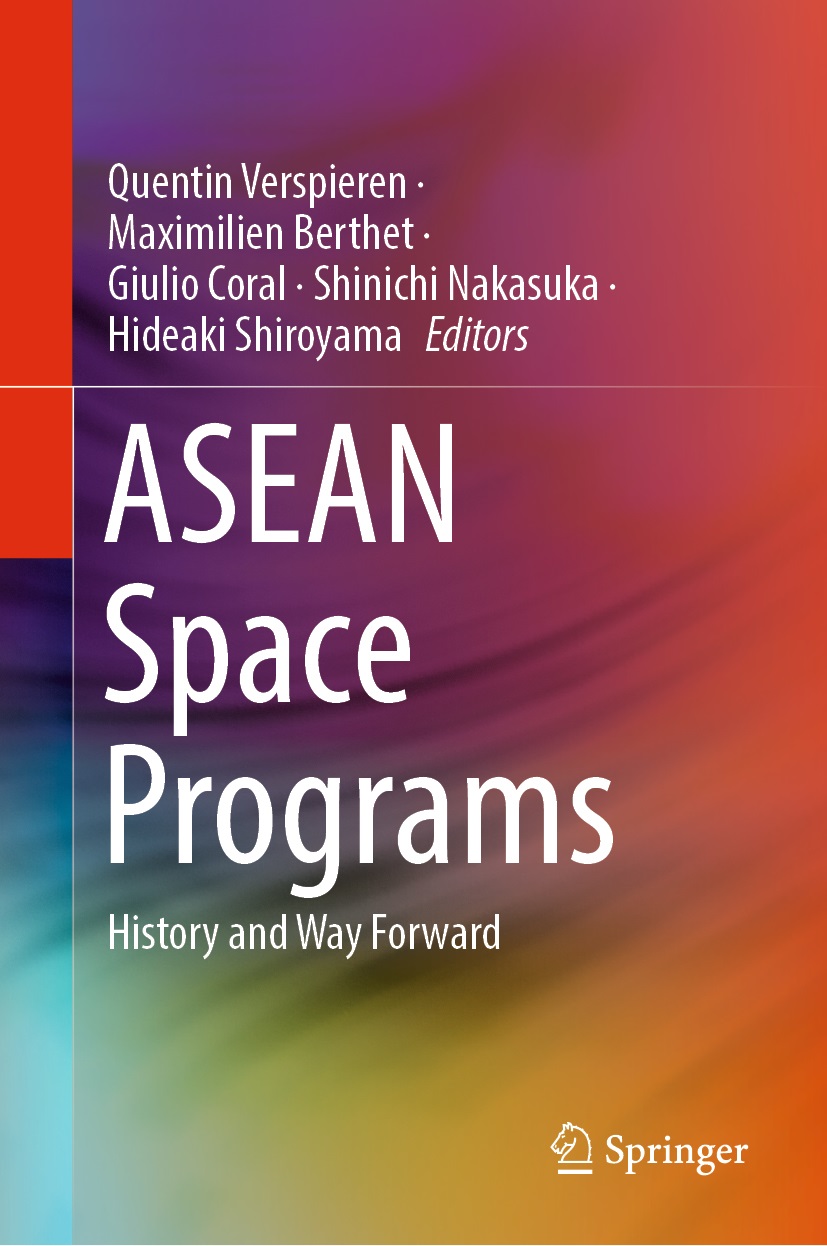
Title
ASEAN Space Programs History and Way Forward
Size
208 pages, hardcover
Language
English
Released
2022
ISBN
978-981-16-7325-2
Published by
Springer Singapore
Book Info
See Book Availability at Library
Japanese Page
This book presents the first-ever comprehensive analysis of ASEAN space development programs. Written by prominent actors in the region, it goes beyond a mere exposé of the history, current status and future plans of ASEAN space technology development and utilization programs, by analyzing the conditions in which a space program can be initiated in the region. It does so in two ways: on the one hand, it questions the relevance of and motivations behind the inception of space development programs in developing countries, and on the other hand, it focuses on the very specific context of ASEAN (a highly disaster-prone area shaped by unique political alliances with a distinctive geopolitical ecosystem and enormous economic potential, etc.). Last but not least, after having analyzed established and emerging space programs in the region, it provides concrete recommendations for any regional or extra-regional developing nation eager to gain a foothold in space. As such, this book offers a valuable resource for researchers and engineers in the field of space technology, as well as for space agencies and government policymakers.
After an introductory chapter justifying the importance to study the potential of space technologies development and applications in ASEAN, the book is organised as follows:
■ Chapters 2–6 present the history of space development in the five countries having already established some form of space program, except Thailand, in alphabetical order of the country’s common name: Indonesia, Malaysia, The Philippines, Singapore and Vietnam. Each chapter is written by a prominent expert from the country’s national space agency or leading university. Often, the authors have been directly involved in the construction of their domestic space program and therefore provide a behind-the-scenes perspective of historical developments, unpublished before this book.
■ The following chapter, the core of this book, provides a detailed summary of lessons and good practices for the establishment of a robust space development program, based on the detailed transversal analysis of the history of each of the five countries. Written by Quentin Verspieren, Chap. 7 aims to serve as a list of ready-to-use lessons for any country willing to start its own domestic space program, which constitutes the primary goal behind the publication of this book.
■ In Chap. 8, Maximilien Berthet and Quentin Verspieren address the situation of remaining countries—in alphabetical order, Brunei, Cambodia, Laos and Myanmar—with regards to space development. After providing a brief overview of each country’s past achievements in the field of space technology development and utilisation (if applicable), Chap. 8 outlines cross-cutting issues and common lessons from these early attempts.
■ The subsequent two chapters introduce a number of objective recommendations for newcomers to the space realm, based on considerations which go beyond the cases of ASEAN countries:
◇ In Chap. 9, Ryohei Takahashi and Nobuhiro Funabiki of The University of Tokyo review different strategies for the development of technical capacity in emerging space countries, based on their extensive expertise in space engineering education through CanSat and CubeSat training programs.
◇ Then, in Chap. 10, Maximilien Berthet addresses a critical issue faced by most governments of developing countries willing to initiate domestic space activities: how to ensure that advanced space technologies, which often require spending important budgets, can be connected with the general population, part of which may be living in extreme poverty?
■ Finally, in Chap. 11, Juliet Braslow, Kelly Hayden and Ingrid Dispert of the United Nations Economic and Social Commission for Asia and the Pacific introduce a series of initiatives conducted by the United Nations in support of the mainstreaming of space technology applications for the socio-economic development and resilience of Southeast Asian countries.
(Written by Quentin Verspieren, Project Assistant Professor, Graduate School of Public Policy / 2022)
Table of Contents
2. Indonesian Space Policy, Regulations and Programs: Past Achievements and Future Prospects (Bagus Rahmadi Supancana)
3. Space Sector Development in Malaysia (Norilmi Amilia Ismail)
4. The Philippine Space Program: A Modern Take on Establishing a National Space Program (Rogel Mari Sese)
5. Singapore, a Sustained Ambition Towards a Commercial Space Sector (David Lit Xian Ho)
6. Vietnam: An Ambitious Satellite Development Program (Pham Anh Tuan and Le Xuan Huy)
7. Comparison of Established ASEAN Space Programs and Lessons Learned (Quentin Verspieren)
8. Other ASEAN Countries: Space Achievements So Far (Maximilien Berthet and Quentin Verspieren)
9. Concrete Recommendations for Space Development in Non-spacefaring Countries (Ryohei Takahashi and Nobuhiro Funabiki)
10. Connecting Space with Citizens of ASEAN: A Social and Policy Ecosystem for Sustainable Space Development (Maximilien Berthet)
11. The Role of the United Nations for Space Applications Development and Utilization in ASEAN (Juliet Braslow, Kelly Hayden, and Ingrid Dispert)
Related Info
ASEAN Space Programs: Policy Considerations (Science, Technology, and Innovation Governance(STIG) Program Graduate School of Public Policy, The University of Tokyo Feb. 8, 2022)
https://www.u-tokyo.ac.jp/focus/en/events/z0116_00106.html



 Find a book
Find a book


 eBook
eBook